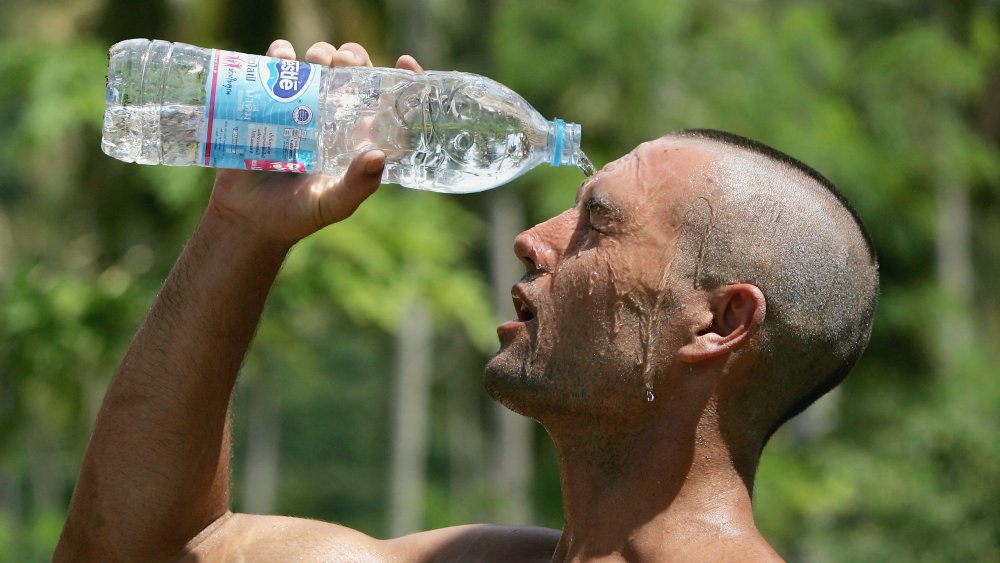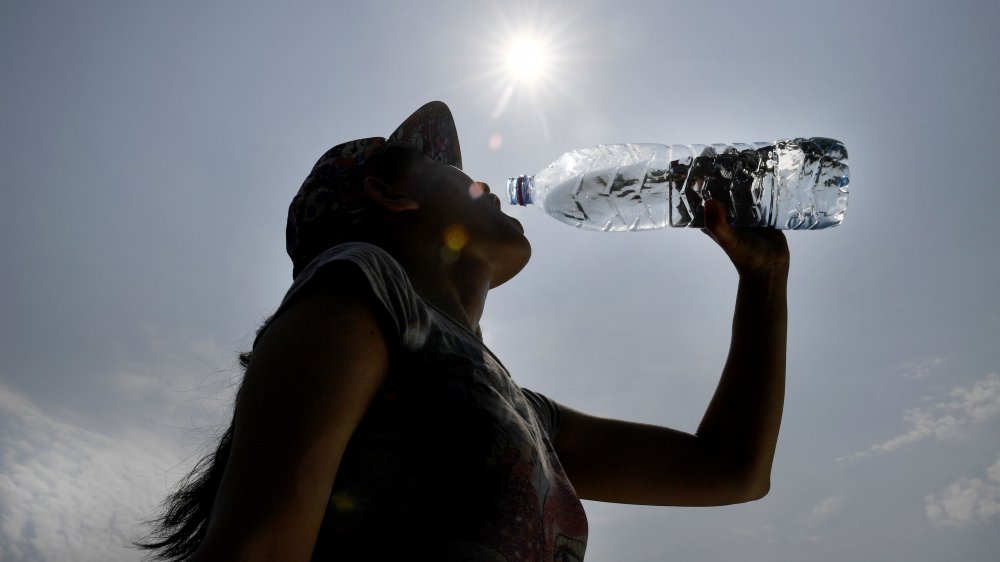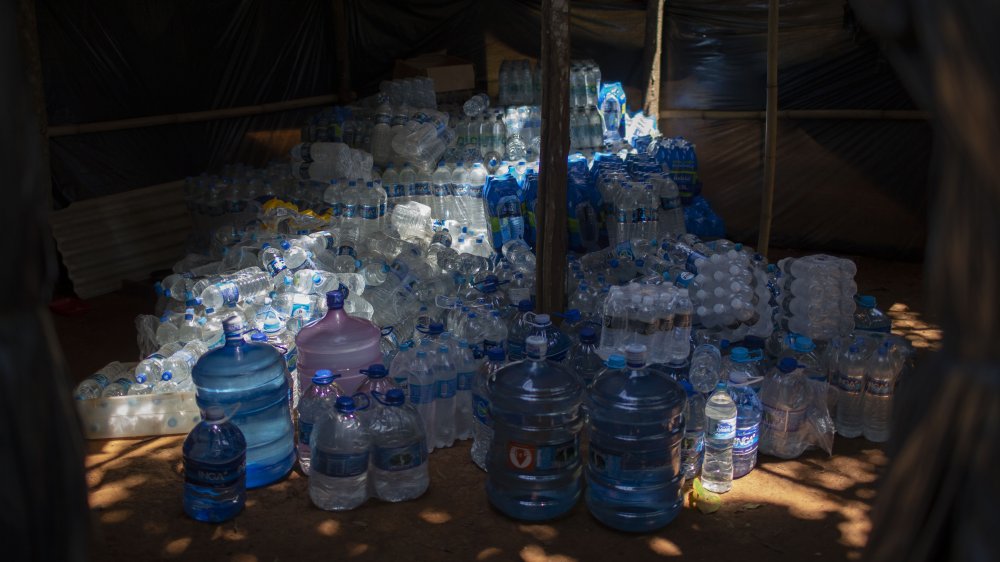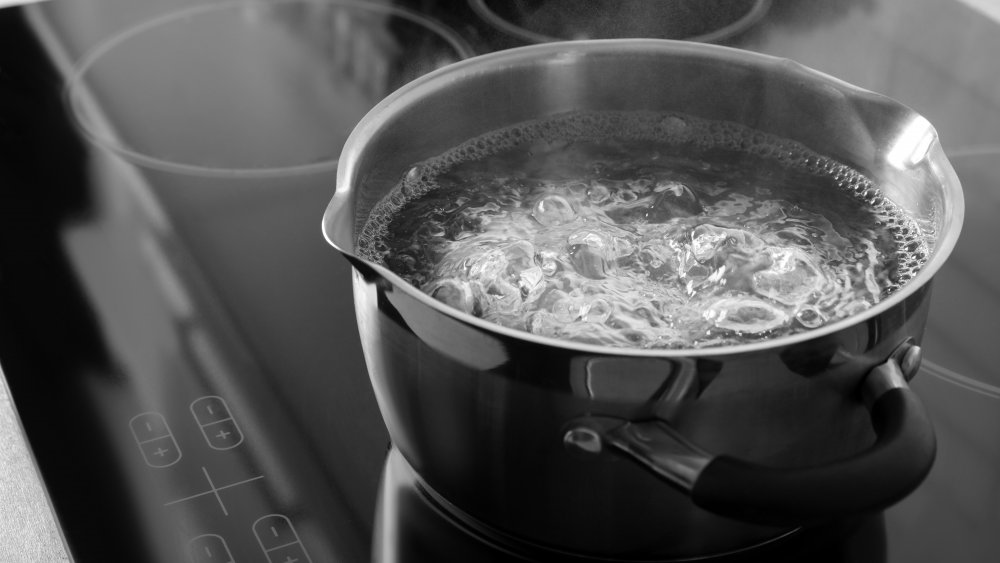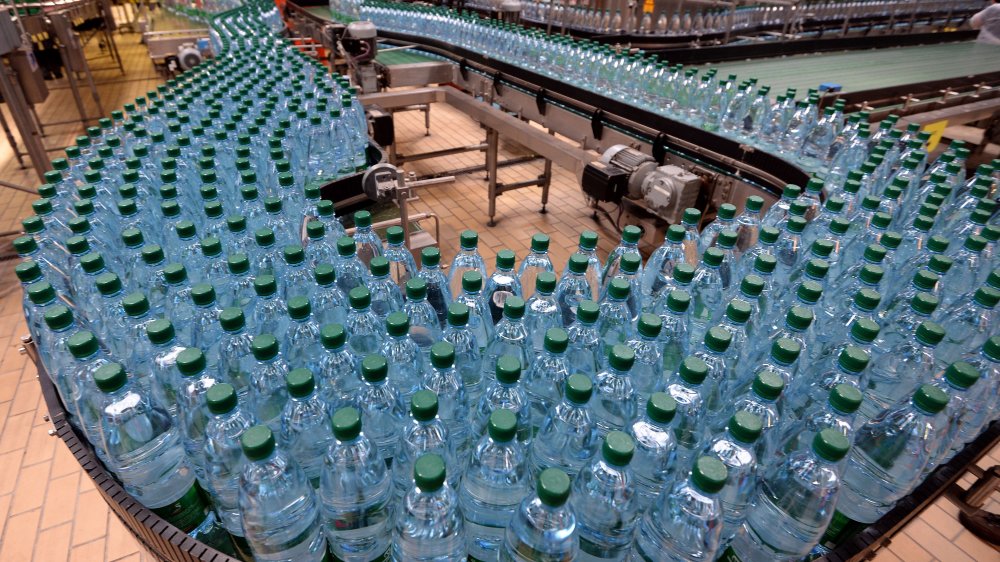The Real Reason Bottled Water Is Selling Out Everywhere
You've read the news, and you've seen the memes: Everyone and their mom has been busy hoarding toilet paper recently. It's an inherently silly product that America has pretty much no chance of ever running out of, so it's no surprise that the people making posterior-themed purchases in bulk have also hogged the majority of media attention. However, there's another product that has been disappearing from the shelves at an alarming rate. We're talking, of course, about bottled water. On March 15, 2020, Charisse Jones and Kelly Tyko of USA Today reported about stores across the country being "picked clean" of supplies, and apart from hand sanitizer and the aforementioned toilet paper, bottled water has been one of the best-selling products, to a point that many retailers have chosen to limit the amount one customer can buy. Jefferson Graham of USA Today told us on March 17 that even the mighty Amazon has found it difficult to keep with the demand, and several brands of bottled H2O have been temporarily out of stock.
So ... what's going on, exactly? Why is everyone suddenly super into bottled water?
Proper preparation and planning?
Yeah, you guessed it: It's the COVID-19 virus. Back in the ancient days of March 4, 2020, Bryan Lufkin of the BBC looked into the phenomenon of panic buying for essentials and "pandemic pantries," and the chaos that ensued as everyone in the supermarket was attempting to stuff their carts full of water bottles. While braving the inhumanly long lines might leave you with enough bottled water and toilet paper to be the envy of every incontinent doomsday prepper out there, there are also many downsides: price gouging, irrational overbuying, and empty shelves due to supply not meeting demand.
Still, can you really blame the people who are genuinely preparing for an emergency if they pick up a few water bottles on the way? No one needs 2,000 rolls of toilet paper, but everyone needs water. Besides, the CDC's instructions for making water safe in an emergency situation specifically name bottled water as the safest hydration option in a time of crisis.
Do you really need to stockpile bottled water?
Here's the thing: According to the United States Environmental Protection Agency, you absolutely don't need a huge pile of bottled water, unless you live somewhere like Flint, Michigan. Drinking tap water is just as safe as it's always been. The World Health Organization has stated that there's no evidence of the novel coronavirus hanging around in drinking water supplies, and considers the risk for it happening to be low. Incidentally, the WHO also says there's no evidence that you can get the COVID-19 virus from sewage, so if you find yourself in an "up the creek without a paddle" situation, that's one less thing to worry about.
On March 10, Irene Jiang of Business Insider spoke with Dr. Manisha Juthani, associate professor of medicine of infectious diseases and epidemiology of microbial diseases at Yale School of Medicinem, and Dr. Irwin Redlener, the director of the National Center for Disaster Preparedness at Columbia University. The expert opinion is that COVID-19 virus isn't likely to make drinking water any less available, and Dr. Juthani was very clear that stocking up on bottled water is unnecessary. However, Dr. Redlener did point out that if you live in an area where supplies aren't all that available, it would be a good idea to have two weeks' worth of bottled water at hand in case you end up in a quarantine situation.
Everybody hates boiling
On a local scale, Hannah McKenzie of KPRC-TV's website Click2houston.com reported one potential motivation for hoarding bottled water on February 28, 2020. When a big part of Houston and nearby areas received a notice to boil their water before using it, stores quickly sold out of the bottled stuff. Houston's boil notice specifically recommended using either bottled or boiled water for drinking and brushing your teeth, and, well, the public clearly made their choice.
Houston's water-boiling situation was caused by a water main break instead of the COVID-19 virus. In fact, the EPA specifically states that "Boiling your water is not required as a precaution against COVID-19." However, if it's any indication of how people behave in an emergency, bottled water will sell like hotcakes in a scenario where it's that or boiling what comes out of the tap. Besides, it's not like Houston is our only example. According to the Irish Times, a similar scenario played out in Dublin in October 2019, and KUT 90.5 reports that it also happened in Austin, Texas in 2018.
It happens whenever there's a crisis looming
In his article about panic buying for BBC Worklife, Bryan Lufkin pointed out that stocking up with supplies is a phenomenon that often happens whenever there's an impending natural disaster. What's more, according to David Savage, Associate Professor of Behavioral and Microeconomics at the University of Newcastle (the one in Australia), "It is rational to prepare for something bad that looks like it is likely to occur." However, he also says that buying "500 cans of baked beans for what would likely be a two-week isolation period" decidedly isn't rational.
Savage and Professor Benno Torgler of Queensland University Of Technology have looked into the phenomenon of stocking up in an article for the Conversation. They say that what many perceive as panic buying is actually a pretty rational response to an impending crisis, and buying enough supplies to last through a potential crisis helps us gain a measure of control. As for why many of us buy too much, this is due to our tendency to "err on the side of caution." So, if you're reading this while staring guiltily at the five cases of bottled water in the corner of the room, don't worry — these two Australian academics have your back. At least, unless you also bought 500 cans of baked beans.
